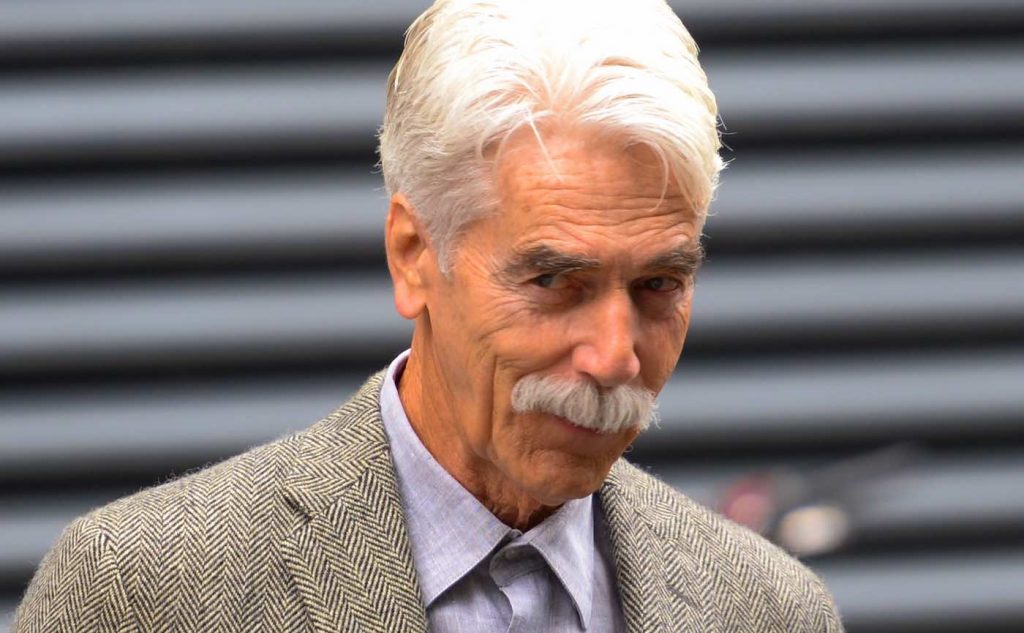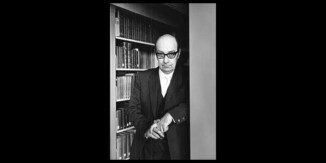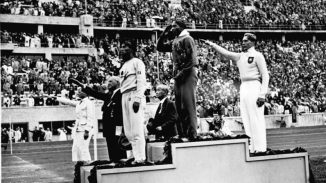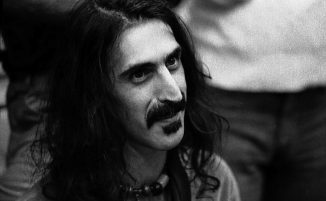Good News in History, August 9
Happy Birthday to Sam Elliott, who turns 80 today. The actor’s lanky physique, thick handlebar mustache, and deep, resonant West Texas drawl have led to frequent roles as cowboys and ranchers, like Virgil Earp (co-starring with Kurt Russell and Val Kilmer) in Tombstone. After being nominated for two Emmy Awards and two Golden Globes (for Conagher; and Buffalo Girls, starring Anjelica Huston), he finally received an Oscar nod last year for his supporting actor role in A Star is Born. WATCH a recent CBS video celebrating his career… (1944)

Other of Elliot’s recent roles include a Netflix series The Ranch, and a lead role in the comedy-drama The Hero, playing an actor dealing with a terminal illness alongside Nick Offerman and Katharine Ross—the actress he married in 1984, after working with her during the filming of The Legacy. They’ve been together for 35 years.
Since 2008 he has been the voice of Smokey the Bear in fire-prevention commercials—an amusing fact because Smokey first appeared in an ad campaign on the very day Sam was born.
EDITOR’S NOTE: Viewers outside the US can view this video on the CBS website, here.
More Good News on this Day:
- Henry David Thoreau published Walden, which described his experiences living near Walden Pond in Massachusetts (1854)
- Smokey Bear was introduced in an ad campaign for forest fire prevention in the US, wearing a ranger hat and saying, ‘Only YOU can prevent forest fires’ (1944)
- The first edition of Ready Steady Go! was shown on UK television, a pop music show that ran until 1966 producing 175 episodes (1963)
- Lauro Cavazos was nominated by President Ronald Reagan to be secretary of education and the first Hispanic to serve in the executive Cabinet (1988)
- Mauritania passed a law criminalizing slavery for the first time (2007)
102 years ago today, Philip Larkin, the English poet and novelist was born. A beloved if somewhat polarizing figure, his poetry has been described as piquant and colloquial, highly structured, but flowing. He’s been criticized as a misogynist and celebrated as the greatest writer post-war England ever produced.

Larkin was born in Coventry to a deeply nihilistic self-made man and a mother who was all too happy to be entirely influenceless in her marriage. His unusual, homeschooled upbringing fostered a love for jazz music, as well as Ezra Pound, T. S. Eliot, James Joyce and above all D. H. Lawrence—all introduced to young Philip by his father.
“Mr. Larkin’s readers must at present be confined to a small circle. Perhaps his work will gain wider appeal as his genius becomes more mature?” suggested the single review of his first book of poems, The North Ship, published in 1945.
9 years later, critics hailed his work triumphantly. “As native as a Whitstable oyster, as sharp an expression of contemporary thought and experience as anything written in our time, as immediate in its appeal as the lyric poetry of an earlier day, it may well be regarded by posterity as a poetic monument that marks the triumph over the formless mystifications of the last twenty years. With Larkin poetry is on its way back to the middlebrow public.” (1922)
Sad Steps was published in Collected Poems (2001)
I part thick curtains, and am startled by
The rapid clouds, the moon’s cleanliness.
Four o’clock: wedge-shadowed gardens lie
Under a cavernous, a wind-picked sky.
There’s something laughable about this,
The way the moon dashes through clouds that blow
Loosely as cannon-smoke to stand apart
(Stone-coloured light sharpening the roofs below)
High and preposterous and separate—
Lozenge of love! Medallion of art!
O wolves of memory! Immensements! No,
One shivers slightly, looking up there.
The hardness and the brightness and the plain
Far-reaching singleness of that wide stare
Is a reminder of the strength and pain
Of being young; that it can’t come again,
But is for others undiminished somewhere.
On this day in 1965, Singapore became the first country ever to gain independence unwillingly, after it was expelled from Malaysia. Affirmative action policies that granted privileges to Malays over other ethnic minorities caused significant unrest after a merger with Sabah, Sarawak, Malaysia, and Singapore. Two years later, the Malaysian Prime Minister Tunku Abdul Rahman decided to expel Singapore from the federation. The Parliament of Malaysia voted 126–0, with all Singaporean MPs boycotting the vote, in favor of the expulsion on 9 August 1965.

On that day, a tearful Lee Kuan Yew announced at a televised press conference that Singapore was a sovereign, independent nation. In a widely remembered quote, he uttered that: “For me, it would be a moment of anguish. I mean for me, it is a moment of anguish because all my life … I have believed in Merger and the unity of these two territories. You know it’s a people connected by geography, economics, and ties of kinship.”
Then, a miraculous thing happened. Singapore showed the global south forever after how to lift a country out of poverty. In many ways, the best way to describe Singapore’s transformation was that Lee Kuan Yew and his government set the table for economic prosperity, and then took their hands off the wheel.
Removing taxes on outside investment, making the national language a trade language, investing in public education of profitable sectors like STEM and ignoring philosophy and political science, and making the city-state as easy a place to start, grow, and run a business as anywhere in the world, has grown the country remarkably faster than its peers, and sees it ranked number 1 on the Doing Business Index, and the Economic Freedom Index.
88 years ago today, track and field star Jesse Owens won his fourth gold medal at the Berlin Olympics—a first for any American athlete.
German leader Adolf Hitler was using the Games to portray a resurgent Nazi Germany—and he had high hopes that German ‘Aryan’ athletes would dominate with victories over, what he believed to be, inferior Africans and Jews. But, Jesse Owens later recounted, “When I passed the Chancellor he arose, waved his hand at me, and I waved back at him.”

Owens was cheered enthusiastically by 110,000 people in Berlin’s Olympic Stadium—and later, ordinary Germans sought his autograph when they saw the world-record holder in the streets. (1936)
And on this day in 1175, construction began on the Tower of Pisa.

Work continued for two centuries during which the tower began its famous tilt due to an inadequate foundation on ground too soft on one side. The freestanding bell tower, which was recently fortified, and its cathedral transformed the Italian city of Pisa into a tourist destination known worldwide. Prior to restoration work performed between 1990 and 2001, the tower—weighing 16,000 tons with a height of 183 feet tall (55m)—leaned at an angle of 5.5 degrees, but the tower now leans at about 3.99 degrees.
And, 93 years ago today, the cartoon character Betty Boop by Max Fleischer made her first appearance. The caricature of a Jazz age flapper, her image became one of the best-known cartoon characters in the world.
WATCH the wild cartoon from 1933 called Betty Boop in Snow White, with Cab Calloway singing as Koko the Clown, which has racked up 2.4 million views on YouTube… (1930)
Also, on this day in 2007, Mayor Sheila Dixon proclaimed August 9 to be Frank Zappa Day in the city of Baltimore, Maryland.

The “prolific composer, musician, author, and film director” was born there in 1940, and even wrote and recorded a song entitled “What’s New In Baltimore?” The Mayor’s proclamation read in part: “Frank Zappa’s artistry involved many musical genres, including rock, jazz, electronic, and symphonic music, and his lasting impact has left an indelible mark… (He) has received worldwide recognition for his talents and innovation and defense of the First Amendment of the Bill of Rights of the Constitution…” This referred to the guitar player’s 1985 testimony before a U.S. Senate committee on the topic of music censorship. READ his brash and outrageously funny autobiography, The Real Frank Zappa Book.
SHARE The Milestones, Memories, and Movies…
>read more at © GoodNews
Views: 0